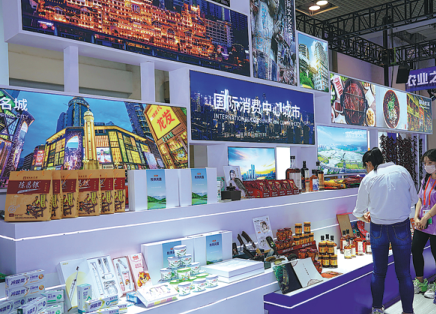Report highlights city's strong potential for investment and business
From:China Daily Date:2022-09-14【Font:large regular】
A report on investment hot spot cities was issued at the recently-concluded 22nd China International Fair for Investment and Trade held in Xiamen, Fujian province, providing insights into the investment environment and potential of cities.
The report was jointly compiled and released by the organizing committee of CIFIT and global consultancy PwC.
Yu Bo, a lead partner of PwC China, said the report elaborates on 18 cities and regions in China, including two national central cities, five sub-provincial cities and six cities whose GDP exceeded 1 trillion yuan ($143.8 billion).
"China is the world's second-largest foreign capital inflow country. Despite pressures brought by the COVID-19 pandemic, the total amount of domestic investment in China has been rising, showing the resilience and vitality of China's economy," Yu said.
Zhang Lijun, another lead partner of PwC China, noted that China's urbanization has so far made great progress, with megacities rising and small and medium-sized cities developing rapidly. While laying a solid foundation for industrial development, cities in China have gradually promoted industrial transformation and upgrading and have seen fruitful results in innovation and green development.
Zhang said that the report analyses a city's investment attractiveness from three dimensions-growth, expansion and reform. With a quantitative evaluation system, it looks at industrial base, growth potential, investment environment and the green transformation of each city. It is expected to help the city to build its brand, attract desirable investment, and provide a reference for investors to guide their investment choices.
Two cities in Fujian province are included in the report. One is Fuzhou, capital of Fujian. Situated on the banks of the Minjiang River, Fuzhou has long served as a gateway to the historic maritime Silk Road and an important commerce hub.
According to PwC, in recent years, Fuzhou's digital economy and marine economy have grown quickly, with well-developed transportation and logistics facilities such as seaports and an airport. The relationship between the local government and enterprises is harmonious, and its export-oriented economy is moving toward high quality.
To date, Fuzhou, as a strategic hub for the 21st Century Maritime Silk Road, focuses on its 16 key industrial chains to attract heavyweights, cultivate clusters and enable industries to grow.
The report says that the deep integration of the real economy and the digital economy has led Fuzhou to a high-quality industrial development.
The level and competitiveness of the city's industrial chain have been continuously improved, and the industrial foundation for building a modern international city has become more solid.
Another city is Quanzhou. The report notes that Quanzhou gives full play to its advantages such as its developed private economy, rich history as a world cultural heritage city and its connections with Quanzhou merchants overseas and in China's Hong Kong, Macao and Taiwan.
Quanzhou is home to nine industrial clusters worth 100 billion yuan in such fields as textiles and clothing, building materials and home furnishing, and electronic information, and also to a number of the top 100 counties in China such as Jinjiang, Shishi, Nan'an, Hui'an and Anxi. Its goal is to become a famous city related to the 21st Century Maritime Silk Road, a strong city with smart manufacturing, and a high-quality city which residents feel proud of, newcomers choose to stay in, and people outside yearn for.

A booth to show the charm of Chongqing is a highlight at the 22nd China International Fair for Investment and Trade.



